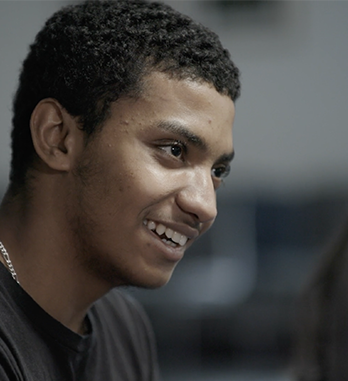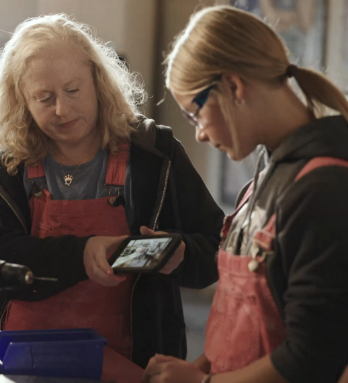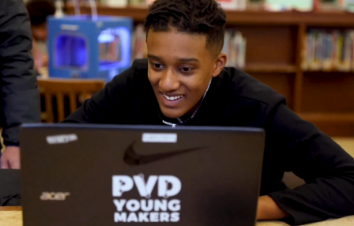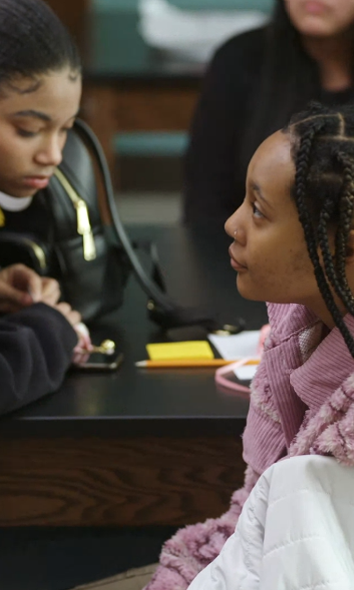





LearnerStudio Presents:
The Brief But Spectacular
Learning Series
Big Ideas, Brief Encounters
This series is designed to cut through complexity and deliver essential insights from some of the entrepreneurs who inspire us. LearnerStudio and the Brief But Spectacular team believe in the power of showcasing big ideas in brief, powerful ways.
For this series, we’ve partnered with a stellar group of leaders who are driving toward future-ready learning. Explore powerful perspectives challenging the status quo and redefining what it means to learn, teach, and connect in the Age of AI.
Belonging and Connection as Drivers of Learning
Cultivating Agency, Relevance, & Purpose
Harnessing AI Toward Human Flourishing
Belonging and Connection as Drivers of Learning
These leaders offer a glimpse into the power of human connection as a driver of learning and thriving – especially as AI and other forces challenge that foundation.
The Rithm Project: Human connection in the Age of AI
We’re connecting with tech itself, not just through it. Companion bots are booming, fueled by loneliness. Michelle Culver shares her take on the future of human connection. From imagining a Year 2040 scenario to testing an AI boyfriend, she urges us to be critical producers, not just consumers. CLICK HERE to learn more.
NACA (Native American Community Academy): Belonging as a foundation for learning
What if belonging was a school’s bedrock? At the Native American Community Academy (NACA), it is. Learners and educators share how centering Native identity creates a community where young people truly see themselves. This unshakeable foundation empowers students to forge positive identities and master the durable skills needed to thrive in school, work, and life.¹ CLICK HERE to learn more.
Valor Collegiate Academies: Centering trust and connection
As AI companions rise and a youth mental health crisis deepens, Valor Collegiate Academies represents a radical solution: human connection. Young people and educators explain how their Compass model centers dialogues where everyone is seen and known. It’s a vital reminder: in an age of artificial connection, authentic human relationships are the most critical work.¹ CLICK HERE to learn more.
Uprooted Academy: Activating the village through adaptive tools
Critical junctures from adolescence to adulthood are breaking students with stress. Tiffany Green of Uprooted Academy is using AI to fight back. Her adaptive roadmap manages the admin grind and adjusts to student stress, activating the village of family, friends, mentors, and supporters. By automating logistics, the tool frees everyone to focus on human connection. CLICK HERE to learn more.
Cultivating Agency, Relevance, & Purpose
These segments challenge the traditional industrial-age model of schooling, focusing on how we redesign the learning environment to center on student choice, mastery, and purpose.
One Stone: Students curating their own curriculum
At One Stone in Idaho, education is fundamentally reimagined. Young people choose their interests, and educators (known as guides) build a custom curriculum to meet them. By putting young people in real-world environments now, and seeing the impact they can have, this model flips the script – putting students squarely in the driver’s seat of their own education.¹ CLICK HERE to learn more.
Big Picture Learning: Real-world learning in action
“I’m just waiting to finish high school so I can start living.” Big Picture Learning is flipping this model. In their approach, students spend time every week in the community – like an airplane hangar training to be aviation pros – working in their area of interest. Then, the curriculum is built around that passion. It’s real-world learning, recognized by new credentials like the IBPLC that validate skills, not just seat time.¹ CLICK HERE to learn more.
The Forest School: Learners as engines of their own learning
Are we graduating dependent learners? Tyler Thigpen argues the old model fails kids who are “listening to answers of questions they didn’t ask.” His solution? Building self-directed learning environments like The Forest School, where guides replace teachers and badges replace grades. This approach lets students struggle productively, connect learning to their calling, and build lifelong skills. CLICK HERE to learn more.
History Co:Lab: Inspiring the next generation of changemakers
Is education just creating “functional economic players?” Fernande Raine challenges this hyper-individualism, arguing that history and civics are essential to activate purpose. These learning experiences aren’t optional. When students connect the past to the present, they don’t just learn how we got here – they understand their role in shaping what comes next. CLICK HERE to learn more.
Building 21: Unleashing the power of competency-based learning
@Building 21 is part of a growing movement to shift from crediting courses to crediting competencies. Thomas Gaffey and Sandra Moumoutjis share their take on competency-based learning. This model shifts value from course credit to skills credit, like critical reading or collaboration. It gives students the space to build agency, connect learning to their passions, and redefine success. CLICK HERE to learn more.
Learner-Centered Collaborative: Designing learner-centered environments
Let go of standardization. Embrace learner agency. The Learner-Centered Collaborative says when students “think freely and move freely,” stressful schools become joyful learning communities. Centering learners by design helps both students and adults thrive. CLICK HERE to learn more.
Harnessing AI Toward Human Flourishing
These segments address the most urgent challenge facing education and society: integrating rapidly evolving AI tools while centering essential human connection.
Playlab: Democratizing AI in education
Stop just using AI, and start shaping it. Educators and leaders need space to play, experiment, and build with the technology. Yusuf Ahmad explains how Playab gives educators tools to create their own real-world applications – not just follow pre-set tools – boosting their agency as problem-solvers. CLICK HERE to learn more.
Ed3DAO:
Reimagining the educator role in the Age of AI
AI can personalize pathways and handle administrative tasks, but AI can’t be an educator. Vriti Saraf champions the non-negotiable human educator. While AI automates mundane work, we cannot over-rely on it for facilitation. AI simply cannot provide the nurturing environment for authentic human relationships – the true core of learning. CLICK HERE to learn more.
Adrian Antao: Partnering with AI in schools
The initial reaction to ChatGPT? “Terror,” says Adrian Antao of KIPP NYC. But using a new AI tool developed with Playlab revealed a surprising power. Yes, it shrinks the feedback cycle on essays. More importantly, Adrian reflects on coaching students to push back on the AI tutor, and how to critically defend their own work. Partnering with AI in this way can mean teaching agency, not just grammar.¹ CLICK HERE to learn more.
¹These episodes were created in part of a series funded by XQ Institute, in collaboration with PBS NewsHour
